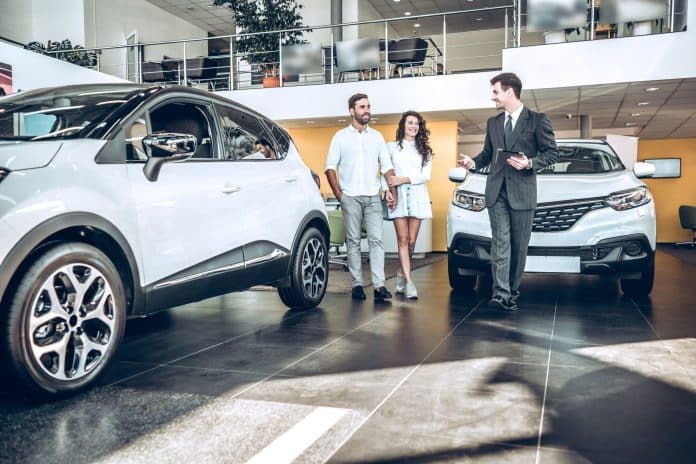
The value of a new car can depreciate by 9-11% as soon as it leaves the dealership. That being said, the depreciation of your vehicle is worth keeping in mind when deciding where you want to buy your car from, the type of car you will buy, etc. Knowing that a new car can lose that much value immediately, can turn buyers off from purchasing this type of vehicle. Instead should you opt for a used car? Well there are plenty of other factors to keep in mind before you make a decision.
Pros of a New Car
The benefits of a new car will vary based on the individual. However, generally people can expect some benefits of a new car to include:
- A Factory Warranty
- No Vehicle History
- Lower Interest Rates
A Factory Warranty
A factory warranty can be beneficial because it is when the automaker promises to fix or replace any defective or faulty issues with the vehicle once it is driven off of the lot. This is a promise from the manufacturer that the car you purchase is in tip top condition and you won’t need to worry about additional expenses. Factory warranties only cover some forms of damage. Issues that come from typical wear and tear like an oil change or brake pads are not covered. However, even though not all forms of damages are covered, it is still a comprehensive protection option. There are also multiple types of factory warranties to be aware of:
- Bumper-to-Bumper Warranty
- Powertrain Warranty
- Corrosion Warranty
- Emissions Warranty
- SRS Warranty
- Roadside Assistance Program
Even with the most comprehensive warranty, there are also exclusions that you will likely face with coverage. These exclusions can include:
- Expected Wear-and-Tear
- Damages Caused by the Environment
- Aftermarket Changes
- Damages Caused in an Accident
- Damages Caused by Misusing the Vehicle
- Issues that are due to a Lack of Maintenance
How long a warranty will last varies. A good rule of thumb is to expect between 3 to 5 years of coverage with a warranty but it is important to confirm with your dealership.
No Vehicle History
When you buy a used car, you need to worry about how previous owners handled the vehicle. There could be secret accidents, undisclosed damage, and plenty of other issues that impact the performance of the car. The worst part? These issues may not be caught until it is too late and they are for you to deal with. That is why buying a new car can be beneficial. Since it is a new vehicle that has never been owned, there are no previous owners that you need to worry about! No previous owners means no shoddy history which can mean less maintenance costs and damages that you have to deal with.
Lower Interest Rates
A popular benefit of purchasing a new car is the fact that you can likely expect to get a lower interest rate compared to a used car. That is because new cars may have the opportunity to qualify for zero percent financing. Generally you can think of interest rates in terms of how old the car is. The older the car, then the more likely you will have a higher interest rate.
Cons of a New Car
Just as there are advantages to getting a new car, there are some disadvantages to be aware of as well. Some common downsides to buying a new car are:
- More Expensive in Price
- Fast Depreciation in Value of the Car
- Unclear Model Reliability
- Increased Insurance
More Expensive in Price
When you are purchasing a new car, you are buying the most up to date technology. This improved technology can cost the buyer to have to spend more on the car overall. Other reasons that new cars typically are more expensive are due to some of the benefits listed above like no vehicle history, less maintenance costs, better interest rates, etc. These factors can make it attractive to buy a new car which is why sellers can sell them for more money. Not every vehicle is the same but it’s a good rule of thumb to expect a new car to be pricier.
Fast Depreciation in Value of the Car
Let’s circle back to the introduction of this article, shall we? As soon as the vehicle leaves the dealership, it loses 9-11% of it’s value. You can expect a new car to lose more value than a used car. That is why if you want a new car but don’t want to lose as much value in your car, you may want to consider gently used options as an alternative.
Unclear Model Reliability
If you buy a new model of a vehicle, you may need to deal with a lack of model reliability. You take on a risk of the vehicle due to the fact that there may be new technology that doesn’t properly work. There are plenty of examples of new technology that end up flopping. This is what can lead to recalls!
Increased Insurance
The more expensive the car then the more insurance you can expect to pay. It’s as simple as that. Insurance companies look at the vehicle they are covering. If the car is old, has a lot of miles on it, and is a basic color then it will cost less than a brand new, no mileage vehicle that is bright red. There are other factors that impact the cost of insurance like location and model of the car as well.
Overall
There are both pros and cons to buying a new car. You want to take a look at your current financial standing when making a decision. Some benefits of buying a new car include a factory warranty, no vehicle history, and lower interest rates. On the flip side, some drawbacks of buying a new car include the fact that it is likely more expensive, has higher insurance costs, has a fast depreciation rate, and may have some unclear model reliability. In the end, it may make more sense to buy a gently used car that is just a couple years old. This can provide the same new car feel without some of the new car drawbacks.

















